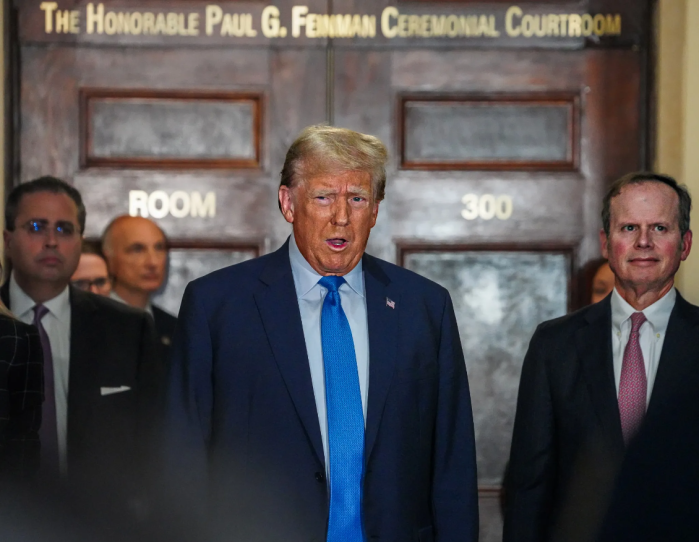Manhattan District Attorney Alvin Bragg sued pro-Trump House Judiciary Committee Chair Jim Jordan Monday for allegedly using his Congressional authority to engage in “a brazen and unconstitutional attack” on the grand jury indictment of the former president, and the prosecutor himself.
Bragg filed a lawsuit in U.S. District Court in Lower Manhattan on April 11 seeking to dismiss a subpoena sought by Jordan — who also chairs the House Select Subcommittee on the Weaponization of the Federal Government — compelling a former Manhattan DA prosecutor, Mark Pomerantz, to testify regarding the office’s activities and his participation into a separate investigation into Donald Trump and his businesses.
Trump — the first ex-president ever to be indicted for a felony crime — faces 34 counts of falsifying business records in the grand jury indictment, unsealed on April 4, which accuses Trump of attempting to cover up hush money payments to two women with whom he was allegedly associated with previously: porn star Stormy Daniels and Playboy model Karen McDougal.
Trump and his supporters, including Jordan, have blasted the indictment as being political in nature, with Trump also targeting Bragg by name with his outrage — which led to the prosecutor receiving death threats ahead of the indictment.
Bragg alleges that Jordan, in his capacity as committee chair, is acting as a defacto defense counsel for Trump — seeking to use the federal panel in an effort to undermine Trump’s local prosecution in New York.
“Chairman Jordan’s subpoena is an unconstitutional attempt to undermine an ongoing New York felony criminal prosecution and investigation,” Bragg said in a statement. “As our complaint details, this is an unprecedented, illegitimate interference by Congress that lacks any legal merit and defies basic principles of federalism. The Manhattan D.A.’s Office focuses on the law and the evidence, not political gamesmanship or threats. We look forward to presenting our case in court to enjoin enforcement of the subpoena.”
In the lawsuit against Jordan, Bragg charges that Congress does not have the power “to supervise state criminal prosecutions,” nor can Congress serve subpoenas “for the personal aggrandizement of the investigators or to punish those investigated.”
Manhattan’s chief prosecutor went a step further and allege that Jordan and the House Judiciary Committee were “participating in a campaign of intimidation, retaliation and obstruction” on the former president’s behalf.
“Chairman Jordan and the Committee have, in essence, appointed Congress as a super grand jury that can flex its subpoena power to second guess the judgment of New York citizens and interfere with the state criminal justice process,” the lawsuit charges.
Bragg further noted that Jordan and his allies, in numerous public statements and letters, “have changed their stories multiple times” regarding their effort to investigate the Trump indictment, creating “a scattershot hodgepodge of new purported legislative interests and purposes that supposedly justify the Committee’s unwarranted incursion into a state criminal case.”
As part of their effort, Jordan announced on Monday that the committee would hold an April 17 hearing in Lower Manhattan to focus on crime in Manhattan. That, along with subpoenaing Pomerantz to testify before the panel, is part of “a retaliatory political circus designed to undermine the rule of law and New York’s police power,” Bragg contended in the lawsuit.
The lawsuit seeks the U.S. District Court for the Southern District of New York to place an injunction on the Pomerantz subpoena in its entirety, which would no longer compel him to testify before the House Judiciary Committee, and a temporary restraining order.
Should the subpoena be upheld, however, Bragg noted that it “still would not be enforceable because it could allow the Committee to seek grand jury material, confidential investigative material and information clearly protected by the attorney-client, work product, deliberative process, law enforcement, informant’s and public interest privileges.”
Jordan has up to 60 days to respond to Bragg’s lawsuit in federal court.
The New York Times first reported the story.


































